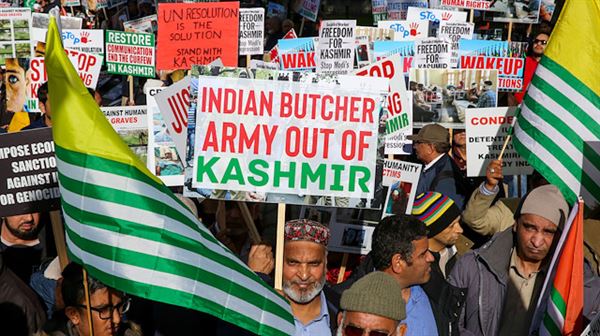Traders in Indian-administered Kashmir are living their worst nightmare amid a near-complete lockdown of the region, with many businesses on the verge
Traders in Indian-administered Kashmir are living their worst nightmare amid a near-complete lockdown of the region, with many businesses on the verge of closure.
Nearly three months into the restrictions, profits are plunging in the disputed region which is held by India and Pakistan in parts and claimed by both in full.
According to estimates of the Kashmir Chamber of Commerce and Industries (KCCI), the losses have crossed $1.41 billion.
On Aug. 5, the Indian government scrapped special provisions granted to Jammu and Kashmir that allowed it to enact its own laws and protected the Muslim majority state’s citizenship law, which barred outsiders from settling in and owning land in the territory.
To quell popular protests, curfew-like conditions were imposed in the region and pro-India leaders detained. The entire political leadership in the region is already either in Indian prisons or under house arrest.
Sheikh Ashiq, KCCI president, told Anadolu Agency: “Almost every sector in the valley has suffered in the last three months. Tourism has been hit hard.”
“Transport is another sector which was hit by the clampdown. Almost 50,000 workers in carpet and handicraft industries have no work. Young entrepreneurs who were dealing with markets in the U.S., the U.K and other European countries also failed to make any contact with their clients because of internet shutdown,” he added.
Young entrepreneurs like Asif Ameen Tibet Baqual feel this was a deliberate attempt by the Indian government to harm the economy of the scenic Himalayan region, a tourist hotspot famous for its handicraft and Cashmere wool.
“They have literally killed it [business]. Nothing is possible at this time when everything is run on the internet. Online businesses are bearing the brunt,” said Baqual, who runs a digital advertising firm.
Saqib Mir, another young entrepreneur, who packages and sells water, juice and tea told Anadolu Agency his business was struggling.
“We failed to do any business in August, but in September we did some business with the help of local contacts. We are still struggling to do business with almost no demand in the valley,” he said.
“I am finding it difficult to pay salaries to my employees,” he added.
A shadow of gloom engulfs the region with locals saying the situation is unlikely to improve in the coming months.
